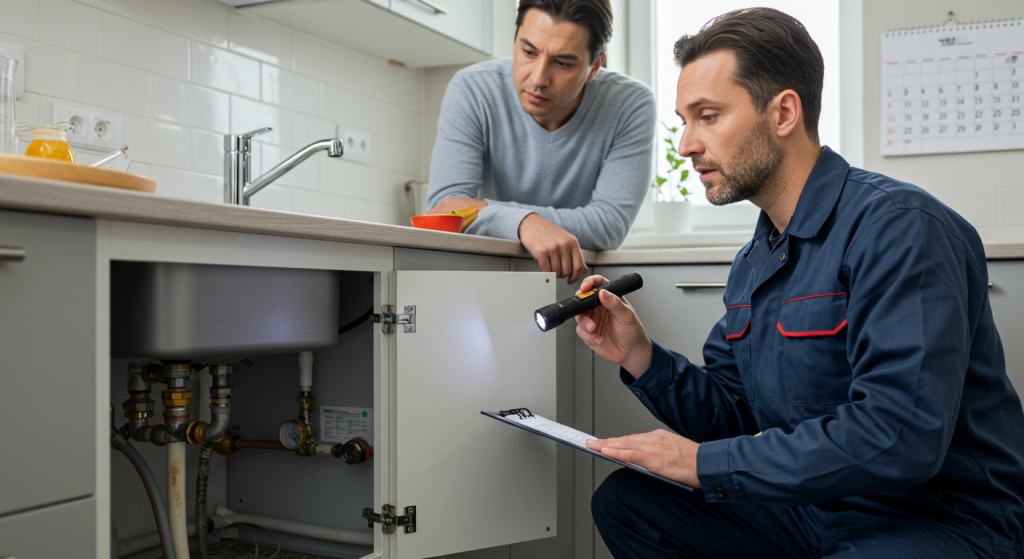
At Swift Plumbing & Heating, we understand the importance of a reliable water heater for your home’s comfort. Recognizing early signs of potential issues can prevent costly repairs and ensure uninterrupted hot water.
Inconsistent or No Hot Water
Experiencing fluctuating or insufficient hot water often points to a failing heating element or thermostat. Sediment buildup can also impair heating efficiency. Our professional plumbers can assess your system to determine if flushing the tank or replacing components is necessary.
Strange Noises Coming from the Tank
Unusual sounds like popping or rumbling typically result from sediment accumulation at the tank’s bottom. Over time, this sediment hardens, causing the appliance to overheat and produce these noises. If your water heater is making persistent noises, it’s advisable to consult a professional to determine whether flushing or additional repairs are required.
Discolored or Rusty Water
Rusty or discolored water from your hot water tap may signal corrosion inside the water heater tank. This corrosion can lead to leaks and compromised water quality. If you notice discolored water, have a plumber inspect the tank to determine if replacing the anode rod or the entire unit is necessary.
Water Leaks Around the Heater
Any moisture or pooling around your water heater is a red flag. Leaks can stem from fractures in the tank due to metal expansions and contractions over time. Ignoring such leaks can lead to significant water damage in your home. If you notice a leak, turn off the water supply to the heater and contact a professional immediately to prevent further damage.
Reduced Water Pressure
Sediment buildup not only affects water temperature but can also clog pipes, leading to decreased water pressure. This can make daily tasks like showering or washing dishes less efficient and more time-consuming. A licensed plumber can diagnose whether flushing the system or replacing pipes is the best course of action.
Foul-Smelling Water
A rotten egg odor from your hot water may indicate bacterial growth within the tank, especially if the water heater is set at a low temperature. This not only affects the water’s smell but can also pose health risks. If you notice this odor, consult a professional who can safely flush and sanitize the system to eliminate bacteria.
The Age of Your Water Heater
Water heaters typically have a lifespan of 8 to 12 years. If yours falls within or beyond this range, it’s more susceptible to inefficiencies and breakdowns. Regular maintenance can extend its life, but an aging unit may require more frequent repairs. If your unit is nearing the end of its lifespan, consider having a professional assess whether replacement is the best option.
Rising Energy Bills
An inefficient water heater works harder to provide hot water, consuming more energy in the process. If you’ve noticed a spike in your energy bills without a corresponding increase in usage, your water heater might be the culprit. A professional can evaluate whether adjustments, repairs, or a more energy-efficient replacement is necessary.
Frequent Need for Repairs
If your water heater requires constant repairs, it may be more cost-effective to consider a replacement. Frequent issues can indicate that the unit is nearing the end of its operational life. Consult a water heater specialist to determine whether further repairs are viable or if upgrading to a new unit is the best long-term solution.
Visible Signs of Corrosion
External rust or corrosion on the tank or its components is a clear indication of deterioration. This can compromise the structural integrity of the water heater, leading to leaks or complete failure. If you see visible rust, contact a professional for an inspection and potential replacement before a major leak occurs.
What to Do If You Notice These Signs
If you’ve observed any of the above indicators, it’s crucial to act promptly:
- Inspect the Unit: Look for visible signs of damage, leaks, or corrosion, but avoid tampering with electrical or gas components.
- Schedule a Professional Flush: Regularly flushing the water heater can remove sediment buildup and enhance efficiency. This should be done by a professional to prevent damage or scalding risks.
- Check the Anode Rod: A plumber can inspect and replace a worn-out anode rod to prevent tank corrosion.
- Consult a Professional: For persistent issues or if you’re unsure about the problem, it’s always safest to seek expert assistance.
How Regular Maintenance Can Prevent Expensive Repairs
Routine maintenance is key to prolonging the life of your water heater:
- Annual Inspections: Having a professional inspect your unit yearly can catch potential problems early.
- Temperature Settings: Keeping the thermostat at 120°F not only provides sufficient hot water but also prevents overheating and reduces energy consumption.
- Seismic Bracing: In earthquake-prone areas like Washington State, securing your water heater with seismic straps can prevent it from toppling during tremors.
FAQs About Water Heater Maintenance and Repair
How often should I flush my water heater?
It’s recommended to have your water heater flushed at least once a year by a professional to prevent sediment buildup and maintain efficiency.
What is the typical lifespan of a water heater?
Traditional tank water heaters last between 8 to 12 years, while tankless models can last up to 20 years with proper maintenance.
Why does my hot water have a metallic taste?
A metallic taste can result from mineral accumulation or corrosion inside the tank. A professional inspection can determine whether flushing the tank or replacing the anode rod is necessary.
Is it normal for my water heater to make noise?
Some noise is typical, but loud popping or banging sounds can indicate sediment buildup. Have a professional address the issue to prevent further problems.
Can I adjust the temperature on my water heater myself?
Yes, you can typically adjust the thermostat on your water heater. However, it’s advisable to consult the manufacturer’s guidelines or a professional to ensure safe settings and avoid the risk of scalding.
Conclusion
Being vigilant about your water heater’s performance and addressing issues promptly can save you from unexpected cold showers and costly repairs. If you’re experiencing any of these warning signs, consider reaching out to Swift Plumbing & Heating for a thorough inspection and necessary repairs. Ensuring your water heater is in optimal condition guarantees comfort and efficiency for your home in Bainbridge Island, WA.

